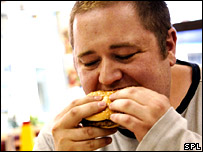
Depression
Anyone can be an emotional eater. After a failed marriage, one woman found she had gained 60 pounds. Yes, some could be linked to the medicine she was on, but a great deal was associated with emotional eating. Experts have started paying more attention to emotional eating in both sexes. They even go so far as to suggest in Women Today that most gains in weight are linked to emotional eating because 75% of overindulging is connected to stuffing the emotions.
Depression is one of the strong emotions associated with overeating. In a depressed mood, most will feel hopeless, tired, and uninterested in activities they used to love. Attempting to cheer themselves up, these people will often turn to food to deal with these feelings. Unfortunately, that overeating causes the pounds to pack on. This weight gain can deepen the depression even further.
Many people overeat out of boredom. With nothing else to do, they rummage through the cupboards to fill the time. Often they sit in front of the TV or computer mindlessly munching on snacks without ever being hungry. Instead of determining why they are bored, or finding something constructive to fill that boredom, these overeaters stuff the time, and their stomachs, with unnecessary fattening foods.
How can you tell if you eat emotionally? You can evaluate your eating habits by asking how it is connected to your emotions. When you are scared, worried, or sad, do you start snacking? Does that snacking or overeating make you feel better, even if it is temporary? When you are angry or disappointed, do you handle those feelings by binging on your favorite comfort food? Have you noticed that after a major change in your life you have started eating more to deal with those feelings? If you answered, “yes” to any of these you could be an emotional eater.

What should you do if you are an emotional eater? First, you can try distracting yourself from the overeating by choosing to do something else instead. When you are bored and start to grab that bag of chips, take the dog for a walk instead. Sign up for dancing class to keep you busy. The alternative activity doesn’t even have to be physical. You could read a book, take up crocheting, or learn a new language. With practice, you can overcome that emotional urge to overeat.
To get to the root of the issue, you can determine what triggers you to eat emotionally. Is there a certain time that it hits? Is there a certain activity such as watching TV that sets off that urge? If you have a certain time and place that triggers your urge to overeat, you can redirect that energy by doing something different, and less fattening, at that time or place.
Networking with others can also offer you support that is needed to beat that overeating urge. You could enlist family members to help you identify when you are overeating and support your efforts to do something else. You could join a support group of other overeaters that is geared to help people that eat emotionally. These often offer someone for you call when you get that urge so that you can talk through the emotion instead of overeating.
If the emotions that are causing you to overeat continue, you may want to consider therapy to deal with them in a healthy way. Often a psychotherapist can help you find ways to cope with the feelings in a more constructive manner. Many times talking to someone other than family is easier and allows a much needed release for those emotions.
Depression





